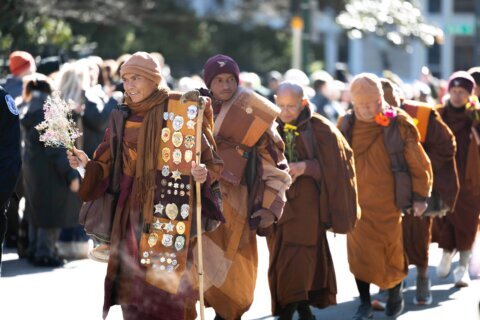WASHINGTON — Eight days after it was born, the first orangutan born at the National Zoo in more than 25 years, has a name and a mother who appears to be a natural after a dozen years of training.
The infant Bornean orangutan, born to mother Batang and father Kyle on Sept. 12, has been named “Redd,” since orangutans are known as the red ape.
“No orangutan birth is ever the same, so you never know what to expect,” said Meredith Bastian, the zoo’s curator of primates. “It took a little while for (Batang) to get the hang of it, but the important thing is Redd is nursing,” she said and the two are now bonding.
The Smithsonian National Zoo’s Great Ape House reopened Tuesday. It closed when the baby orangutan was born, to give mother and baby quiet during what is considered the most risky time of a baby primate’s life.
While the building is open, Batang and Redd may or may not choose to make an appearance — Tuesday morning they were in an area out of public view, Bastian said.
“You would not expect to see the infant away from the mother at all, so 100 percent of the time the infant is clinging very closely to mother,” said Bastian.
Primates curator Meredith Bastian says mother and baby are doing well.
However, father Kyle is unfazed, or more specifically, unaware.
“In the wild, the orangutan father would not be involved at all,” Bastian said. “Kyle does not know that he is the father, so it could have been one of the males.”
While 19-year-old mother Batang’s mothering instincts seem strong, the zoo was ready if that weren’t the case.
“We actually started training on maternal behaviors and skills about three years before Redd was born, so this birth has been 12 years in the making,” said Amanda Bania, great apes keeper at the National Zoo.
“I think as most females can attest to, once you are pregnant, sometimes you don’t want to do as many things, you don’t feel so great,” said Bania. “So, we intentionally started a couple years before she even came off her contraceptive.”
During her training, Bania said Batang was presented with a plush orangutan that was purchased at the zoo gift shop.
She was trained to present the toy ape to keepers for pretend bottle feedings, so Batang would be comfortable handing over her baby if she didn’t get the hang of feeding.
“Sometimes mothers, especially first time mothers, won’t necessarily know what to do right away, and leave babies on the ground or unattended,” said Bania. “So, one of the behaviors we taught her was ‘Go get your baby, and bring your baby to us.’
Keepers reinforced the importance of Batang caring for her baby.
“Any time she left that plush orangutan on the ground, we’d tell her, ‘Nope, got to get your baby, got to get your baby,’ Bania said.
At first, Batang carried the stuffed animal around by an arm or leg,” said Bania.
“The plush orangutan doesn’t mind, but the baby certainly would,” she said.
The Zoo’s Great Ape House is open to the public, 9 a.m. to 6 p.m., daily.
Great apes keeper Amanda Bania was involved in mother Batang’s prenatal training:








